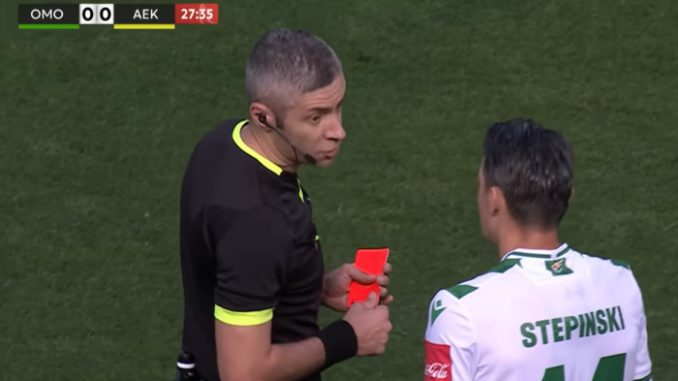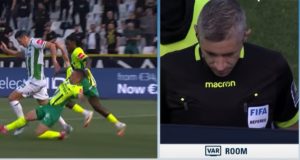
Rapid’s Strong Statement Against Radu Petrescu’s Arbitration After FCSB Match: “Arbitrators Are Rewarded When They Favor FCSB”
Three days after the SuperLiga derby between Rapid and FCSB, which ended with a 1-2 victory for the “roș-albaștri,” central referee Radu Petrescu was assigned to officiate the Cyprus Cup semi-final first leg between Omonia Nicosia and AEK Larnaca, which ended in a 0-0 draw. The Giulești-based team vehemently contested Petrescu’s handling of the game, particularly his refusal to award a penalty in the 71st minute when Târnovanu fouled Christensen inside the penalty box. However, Rapid also pointed out that just about 10 minutes before that incident, Petrila had stomped on Tănase without receiving a yellow card, despite it being a second booking offense that should have resulted in a red card.
Rapid’s Critique: “Mr. Balaj is Right When He Says Referees Are Rewarded for Mistakes in Favor of FCSB”
Following the match, Rapid continued its criticism of Petrescu after discovering that the referee had been assigned to an international fixture with a payment of approximately 5,000 euros—four times higher than the rate for refereeing in Romania. In response, the club issued a statement on their official Facebook page, citing Cristi Balaj, the president of CFR Cluj, who claimed, “Referees are rewarded when they make mistakes in favor of FCSB.”
In their statement, Rapid emphasized their concerns about the apparent bias favoring FCSB and questioned the fairness of the situation. They expressed their belief that it was “not normal for a single team, FCSB, to be consistently advantaged” and reiterated their demand for an official statement from Kyros Vassaras, the president of the Central Commission of Referees (CCA), regarding Petrescu’s performance during the Rapid-FCSB match.
Rapid’s Full Statement: “It’s Confirmed Again: Referees Are Not Penalized, They Are Rewarded”
“We have observed, along with the entire press, how the Central Commission of Referees rewarded Mr. Radu Petrescu following his appalling performance in the match between our team and FCSB,” the statement began. Rapid continued by accusing Petrescu of making clear mistakes that favored FCSB, something that was not only pointed out by the club but also by specialists, the press, and even other teams in the play-off. Despite this, Vassaras decided to reward Petrescu with an international assignment and a significant financial reward.
Rapid expressed their belief in Cristi Balaj’s assertion that “referees are rewarded when they make mistakes in favor of FCSB.” The club emphasized that such behavior cannot be tolerated as normal in football.
“We cannot accept that this injustice, these thefts, are treated as normal. It is NOT normal for our players to step onto the field knowing that the result doesn’t entirely depend on their performance and effort! It is NOT normal for one single team—FCSB—to be constantly favored and placed above the integrity of football, the history and reputation of other clubs.”
Rapid’s Call for Accountability: A Public Response is Needed
The statement concluded with a strong call for accountability: “We demand once again a public response from the Central Commission of Referees, as well as a clear explanation from Mr. Vassaras regarding the lack of impartiality and fair play in the arbitration of last Sunday’s match. We will not give up, and if we do not receive a clear and fair response, we will turn to higher authorities to ensure we get one.”
Rapid’s stance reveals their frustration with what they perceive as an ongoing issue of biased refereeing that unfairly benefits FCSB. The club’s statement and their request for transparency from the refereeing authorities underline their determination to challenge what they believe to be a systemic problem in Romanian football.
The Context and Aftermath of the Rapid-FCSB Derby
The SuperLiga match between Rapid and FCSB was a crucial encounter in the race for the play-off spots, with both teams seeking to secure a top position. While the game ended with a 2-1 win for FCSB, the controversy surrounding Petrescu’s decisions and the perceived favoritism toward FCSB has sparked a debate that goes beyond just this match. Rapid’s vocal criticism of the referee’s performance highlights a growing concern among Romanian clubs regarding the perceived lack of impartiality in officiating, particularly when it comes to FCSB.
Rapid’s complaint is not just about one bad call but reflects a broader dissatisfaction with what they see as a pattern of decisions that favor the same team. By drawing attention to Petrescu’s international assignment and his reward for what they consider poor officiating, Rapid is questioning the integrity of the system and calling for more accountability in how referees are assigned to important matches.
The statement also mentions the involvement of Cristi Balaj, a former referee who is now the president of CFR Cluj. Balaj has been vocal about his concerns with Romanian refereeing and has often criticized the way FCSB is treated in the league. Rapid’s decision to quote him adds weight to their argument and signals that they are not alone in their frustrations.
As the controversy unfolds, the ball is now in the court of the Central Commission of Referees and Kyros Vassaras, who will need to address these serious allegations and provide a transparent explanation of how referees are assigned to matches and what steps are being taken to ensure fairness in the future.

Looking Ahead: Will Rapid’s Efforts Bring Change?
Rapid’s determination to seek justice and transparency indicates that they are not willing to let this issue slide. The club has made it clear that they will pursue this matter further, even if it means escalating the issue to higher authorities. Their strong stance could potentially lead to greater scrutiny of Romanian refereeing practices and might push for changes that could level the playing field for all teams in the SuperLiga.
The ongoing debate over refereeing in Romanian football is far from over, and Rapid’s efforts may mark the beginning of a wider push for reform in the country’s footballing landscape. As the situation develops, it will be interesting to see how the CCA responds and whether the issues raised by Rapid will be addressed in a meaningful way.

Leave a Reply